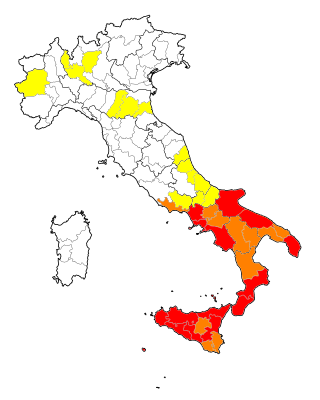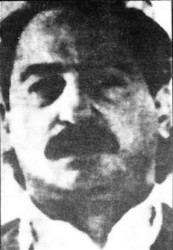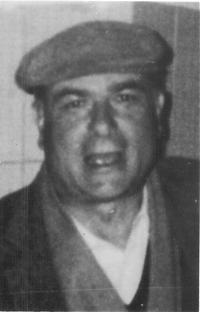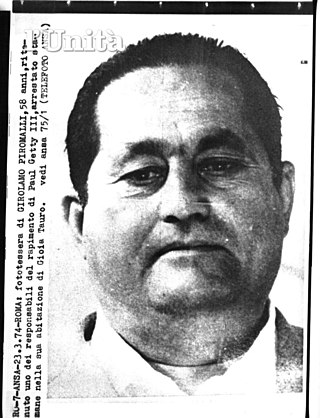Related Research Articles
The 'Ndrangheta is an Italian Mafia Cult-type organized crime syndicate based in the peninsular region of Calabria and dating back to the 18th century. It is considered one of the most powerful organized crime groups in the world. Since the 1950s, following wide-scale emigration from Calabria, the organization has established itself worldwide. It is characterized by a horizontal structure made up of autonomous clans known as 'ndrine, based almost exclusively on blood ties. Its main activity is drug trafficking, on which it has a near monopoly in Europe, but it also deals with arms trafficking, money laundering, racketeering, extortion, loan sharking, and prostitution. The 'Ndrangheta enjoys a privileged relationship with the main South American cartels, which consider it their most reliable European partner.
The Camorra is an Italian Mafia-type criminal organization and criminal society originating in the region of Campania. It is one of the oldest and largest criminal organizations in Italy, dating to the 17th century. The Camorra's organizational structure is divided into individual groups called "clans". Every capo or "boss" is the head of a clan, in which there may be tens or hundreds of affiliates, depending on the clan's power and structure. The Camorra's main businesses are drug trafficking, racketeering, counterfeiting, and money laundering. It is also not unusual for Camorra clans to infiltrate the politics of their respective areas.
Sacra Corona Unita, also known as Fourth Mafia, is a Mafia-type criminal organization from the Apulia region in Southern Italy, and it is especially active in the areas of Brindisi, Lecce, and Taranto.

The Nuova Mala del Brenta (NMB), also known as New Brenta Mafia, is a criminal organization based in the Veneto region of Italy. The group is believed to have emerged in the late 1990s as a successor to the original Mala del Brenta, which was active in the area during the 1970s and 1980s.

Organized crime in Italy and its criminal organizations have been prevalent in Italy, especially Southern Italy, for centuries and have affected the social and economic life of many Italian regions since at least the 19th century. There are six major native mafia-like organizations that are heavily active in Italy. The oldest and most powerful of these organizations, having begun to develop between 1500 and 1800, are the 'Ndrangheta from Calabria, the Cosa Nostra from Sicily and the Camorra based in Campania. In addition to these three long-established organizations, there are also three other significantly active organized crime syndicates that were founded in the 20th century: the Stidda of Sicily, and the Sacra Corona Unita and Società foggiana, both from Apulia.

Antonio Macrì, popularly known as Zzi 'Ntoni, was a historical and charismatic boss of the 'Ndrangheta, a criminal and mafia-type organisation in Calabria, Italy. He was born in Siderno on the Ionian coast of Calabria and was the capobastone of the 'ndrine in his hometown.

Antonio Pelle, also known as Ntoni Gambazza, was a historically significant and charismatic 'Ndrangheta boss from San Luca in Calabria. He was the patriarch of the San Luca locale and the 'Ndrangheta capo crimine, the titular head of the organisation, although with little effective power. He reached the rank of vangelo, at the time the highest rank in the organisation.

Giuseppe Piromalli, also known as "Peppino", was an Italian criminal known as a member of the 'Ndrangheta in Calabria. A native of Gioia Tauro, Piromalli was one of the most famous of the 'Ndrangheta bosses and headed the Piromalli 'ndrina. He redirected the 'Ndrangheta clan from its rural base to an entrepreneurial criminal organisation.

Giuseppe Morabito, nicknamed 'u tiradrittu, is an Italian criminal and a historical boss of the 'Ndrangheta, a Mafia-type organisation in the region of Calabria (Italy). He hails from Africo in the Locride. He was a fugitive from 1992 and included in the list of most wanted fugitives in Italy until his arrest in February 2004.

Giuseppe Coluccio is an Italian criminal and a member of the 'Ndrangheta, a Mafia-type organisation in Calabria. He was a fugitive since 2005 and included in the list of most wanted fugitives in Italy until his capture on 7 August 2008, in Toronto, Ontario, Canada.

The Piromalli 'ndrina is one of the most powerful clans of the 'Ndrangheta, a criminal and mafia-type organisation in Calabria, Italy. The 'ndrina is based in Gioia Tauro on the Tyrrhenian coast. The Piromalli's are allied with their relatives of the Molè family, also from Gioia Tauro. Often they are referred to as the Piromalli-Molè clan. The Piromalli clan contains more than 200 members.
The Cataldo 'ndrina is a clan of the 'Ndrangheta, a criminal and mafia-type organisation in Calabria, Italy. This particular 'ndrina is based in Locri, a hotbed of 'Ndrangheta activity. The clan, allied with the Marafioti family, is involved in a long blood feud with the Cordì 'ndrina, from the same town, since the end of the 1960s.
The Bellocco 'ndrina is a clan of the 'Ndrangheta, a criminal and mafia-type organisation in Calabria, Italy. The 'ndrina is based in Rosarno, on the Tyrrhenian coast, and belongs to the locale of that town, particularly very active in drugs trafficking, arms trafficking, extortion and control of commercial and entrepreneurial activities.
Girolamo Molè, also known as Mommo, is an Italian criminal and a member of the 'Ndrangheta in Calabria. He is currently serving several life sentences.
The Siderno Group is a criminal association in Canada, Australia and Italy related to the 'Ndrangheta, a Mafia-type organization in Calabria. The association is labelled the "Siderno Group" because its members primarily came from the town of Siderno on the Ionian coast in Calabria and migrated to Canada and Australia in the 1950s.
The Commisso 'ndrina is a powerful clan of the 'Ndrangheta, a criminal and mafia-type organization in Calabria, Italy. The 'ndrina is based in Siderno, but also has a branch in the Greater Toronto Area in Canada as part of the Siderno Group. The Commisso clan is involved in international drug trafficking using family ties in Italy, Canada, the United States and Australia.
Salvatore Pelle, also known as Sarvu Gambazza is an Italian criminal and a member of the 'Ndrangheta, a Mafia-type organisation in Calabria.
Rocco Morabito is an Italian criminal and a member of the 'Ndrangheta, a Mafia-type organisation in Calabria. Before being arrested in Uruguay on 4 September 2017, he had been a fugitive since 1994 being wanted for drug trafficking, Mafia association and other serious crimes. In June 2019, Morabito escaped from prison, and was arrested again in Brazil in May 2021.
The Pelle 'ndrina, also known as the Pelle-Vottari, are a clan of the 'Ndrangheta, a criminal and mafia-type organisation in Calabria, Italy. They are among the most influential 'ndrine of the 'Ndrangheta having members who regularly reside in the advisory and top management bodies of the organization, in particular in the Ionian mandamento and in the crimine. They are also present in Milan and its metropolitan city.
References
- 1 2 Sergi, Anna. "Fifth Column: Italy's Fifth Mafia, the Basilischi".
{{cite journal}}: Cite journal requires|journal=(help)